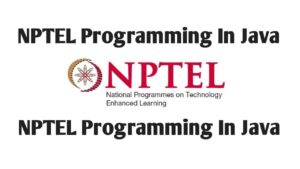Nptel Programming in Java Week 5 Assignment Answers
Nptel Programming in Java Week 5 Assignment Answers
Searching for the Week 5 answers of the NPTEL “Programming in Java” course? You’re in the right spot! Here, you’ll find reliable and up-to-date solutions to help you complete your Week 5 assignment with confidence.

Programming In Java
With the growth of Information and Communication Technology, there is a need to develop large and complex software. Further, those software should be platform independent, Internet enabled, easy to modify, secure, and robust. To meet this requirement object-oriented paradigm has been developed and based on this paradigm the Java programming language emerges as the best programming environment. Now, Java programming language is being used for mobile programming, Internet programming, and many other applications compatible to distributed systems. This course aims to cover the essential topics of Java programming so that the participants can improve their skills to cope with the current demand of IT industries and solve many problems in their own filed of studies.
PREREQUISITES : This course requires that the students are familiar with programming language such as C/C++ and data structures, algorithms.
INDUSTRY SUPPORT : All IT companies.
COURSE LAYOUT – Click To Know More
Nptel Programming in Java Week 5 Assignment Answers
Q1. Which of the following statement(s) is/are true about finally in Java?
I. The finally block is executed regardless of whether an exception is thrown or not.
II. A finally block can exist without a catch block.
III. The finally block will not execute if System.exit() is called in the try block.
IV. A finally block can have a return statement, but it is not recommended to use.
a) I and II
b) II and III
c) I, III, and II
d) I, II, III, and IV
Q2. What will be the output of the following Java program?
interface A {
int x = 10;
void display();
}
class B implements A {
public void display() {
System.out.println("Value of x: " + x);
}
}
public class Main {
public static void main(String[] args) {
B obj = new B();
obj.display();
}
}
a) Value of x: 10
b) Value of x: 0
c) Compilation Error
d) Runtime Error
Q3. What will be the output of the following program?
class NPTEL {
public static void main(String[] args) {
try {
int a = 5;
int b = 0;
System.out.println(a / b);
} catch (ArithmeticException e) {
System.out.print("Error ");
} finally {
System.out.print("Complete");
}
}
}
a) 5 Complete
b) Error Complete
c) Runtime Error
d) Compilation Error
Q4. Which of the following is TRUE regarding abstract classes and interfaces in Java?
I. Abstract classes can contain constructors, but interfaces cannot.
II. Interfaces support multiple inheritance, but abstract classes do not.
III. Abstract classes can have both abstract and concrete methods, whereas interfaces only had abstract methods before Java 8.
a) I, II, and III
b) II only
c) I and II only
d) II and III only
For Latest Update Join our official channel: Click here to join
Q5. Which of the following is a checked exception in Java?
a) NullPointerException
b) ArrayIndexOutOfBoundsException
c) IOException
d) ArithmeticException
Q6. Which keyword is NOT used by Java during exception handling?
a) try
b) catch
c) final
d) finally
Q7. What is the purpose of the throws keyword in Java?
a) To declare exceptions that a method can throw
b) To throw an exception immediately
c) To catch an exception
d) It is not a keyword in Java
Q8. Which of the following is TRUE about interfaces in Java?
a) Interfaces should always be defined as final
b) Interfaces can be instantiated directly.
c) Interfaces can extend multiple interfaces.
d) Interfaces cannot have any method signatures.
For Latest Update Join our official channel: Click here to join
Q9. What will be the output of the following code?
interface Demo {
void display();
}
class Test implements Demo {
public void display() {
System.out.println("Hello, NPTEL!");
}
}
public class Main {
public static void main(String[] args) {
Test obj = new Test();
obj.display();
}
}
a) Hello, NPTEL!
b) Compilation Error
c) Runtime Error
d) No Output
Q10. What will be the output of the following Java program?
interface Calculator {
void calculate(int value);
}
class Square implements Calculator {
int result;
public void calculate(int value) {
result = value * value;
System.out.print("Square: " + result + " ");
}
}
class Cube extends Square {
public void calculate(int value) {
result = value * value * value;
super.calculate(value);
System.out.print("Cube: " + result + " ");
}
}
public class Main {
public static void main(String[] args) {
Calculator obj = new Cube();
obj.calculate(3);
}
}
a) Square: 9 Cube: 9
b) Cube: 27 Square: 9
c) Square: 9 Square: 27 Cube: 27
d) Square: 9 Cube: 27 Square: 27
Nptel Programming in Java Week 6 Assignment Answers – Click Here